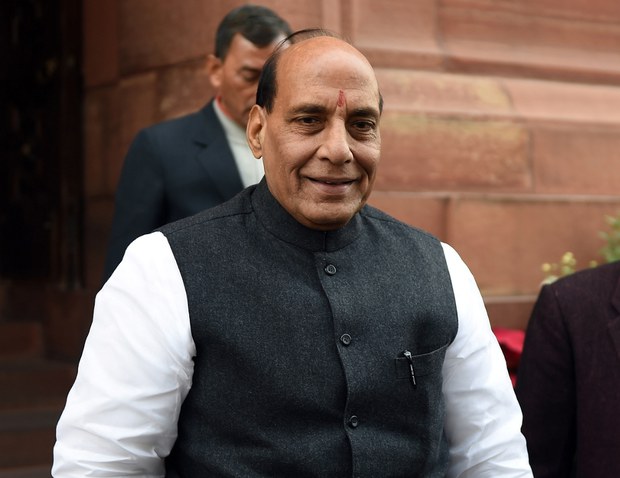Hunt for Suspects Brings Multi-City Terror Alert to India
2016.03.07
Srinagar, India
 Indian Home Minister Rajnath Singh, pictured leaving parliament in December, called an emergency meeting Monday of top intelligence officials after receiving a tip from Pakistan about possible infiltration by 10 suspected terrorists.
Indian Home Minister Rajnath Singh, pictured leaving parliament in December, called an emergency meeting Monday of top intelligence officials after receiving a tip from Pakistan about possible infiltration by 10 suspected terrorists.
Security forces were searching Monday for 10 suspected militants who may have crossed into India via the state of Gujarat that borders Pakistan, which, for the first time officially shared intelligence with its neighbor on possible infiltration.
Besides Gujarat, a terror alert was sounded in Delhi, West Bengal, Jammu and Kashmir, Himachal Pradesh, Rajasthan, Tamil Nadu, Maharashtra, Goa and Karnataka states, after Pakistani intelligence on Saturday suggested that 10 Lashkar-e-Taiba (LeT) and Jaish-e-Muhammad (JeM) members had crossed the border to launch an attack in India.
Security has been beefed up at key military installations, airports, railway stations and religious shrines across the country, police said. Several teams of the National Security Guard (NSG), India’s elite force, are involved in the operation.
There is no information on the identities of the suspects or their targets, according to P.C. Thakur, Gujarat’s director general of police.
“Every policeman has been armed to his strength and people have been asked to report anything suspicious to avert a possible tragedy,” Thakur said.
Home Affairs Minister Rajnath Singh called an emergency meeting of top officials of the Intelligence Bureau and India’s external intelligence agency, the Research and Analysis Wing (R&AW).
The tip-off, which is being hailed as an “unprecedented action” by Pakistan amid stalled bilateral peace talks, followed the discovery of an abandoned boat off Gujarat’s Koteshwar coast on Friday.
Foreign-secretary level talks aimed at improving long-strained ties between the two rivals were postponed indefinitely in January after an attack at an Indian air force base by suspected Pakistani militants.
New Delhi said it provided crucial evidence to Islamabad that the strike was carried out by the Pakistan-based JeM.
JeM chief Masood Azhar was one of the Pakistani handlers of the Jan. 2 attack on the Pathankot Air Force Station, according to Indian security forces. All six attackers were killed in the three-day assault, which left seven Indian security personnel dead.
Pakistani Prime Minister Nawaz Sharif’s foreign policy adviser, Sartaj Aziz, said recently in a televised interview in India that Pakistan was acting on the leads and Azhar had been in “preventive custody since Jan. 15.”
Three other JeM operatives were charged last month by Pakistani authorities for involvement in the Pathankot attack.
India has also given its nod to a Pakistani team visiting the base to continue their investigation into the attack.
Exact dates of the arrival of Pakistani investigators will be known next week, according to media reports.
Boost to strained ties
The latest intelligence tip-off, by Pakistan’s National Security Adviser Nasir Khan Janjua to his Indian counterpart Ajit Doval, is bound to give a significant boost to bilateral ties, analysts said.
“Sharing of intelligence related to a potential terror strike is definitely a positive move that should satisfy India and enable two nations to develop some amount of trust in each other,” Srinagar-based political analyst Gul Wani told BenarNews.
“The vitiating factor between the relations of two countries is terror, which is affecting both sides. Such intelligence sharing could lead to better understanding between India and Pakistan,” Wani said, adding it was high time the two countries realized that terror could not be fought without joint collaboration.
Sameer Patil, a security analyst with the Mumbai-based think tank Gateway House, said the recent action by Pakistan to fight terror had set the stage for talks in the near future.
Sharif and Indian Prime Minister Narendra Modi both are scheduled to be in Washington, D.C., for the fourth Nuclear Security Summit, on March 31 to April 1. Patil said he expected talks between the two leaders to take place during that visit.
“Pakistan is finally making an attempt to demonstrate to the world community that is serious about addressing India’s concerns on terrorism.
“India had made clear that it would not hold talks with Pakistan until it acts sternly against the perpetrators of the Pathankot attack. But now, with Pakistan making a few arrests and also sharing intelligence on terror, I think it would enable Modi and Sharif to discuss ways to move forward to combat terrorism,” Patil told BenarNews.
But Imtiyaz Ahmad, a New Delhi-based political analyst, was sceptical that the dialogue process would move ahead until Pakistan had arrested and convicted JeM chief Azhar.
“Surely, the latest move by Pakistan (to share intelligence) is a good confidence building move, but it won’t break the diplomatic stalemate between the two countries,” Ahmad told BenarNews.
“New Delhi will cautiously respond to this sudden gesture by Islamabad, while continuing to demand action against JeM leaders to resume the stalled dialogue.”







